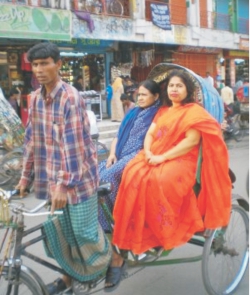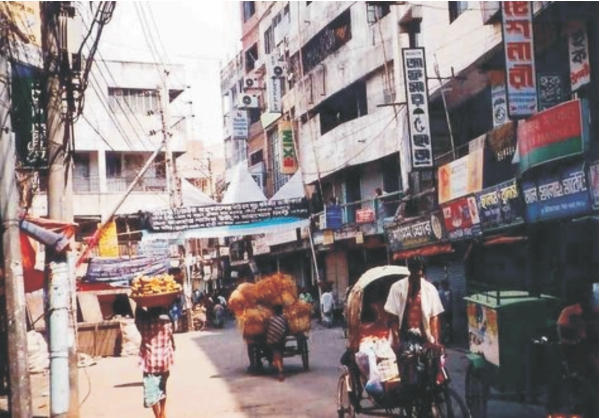| Home - Back Issues - The Team - Contact Us |
 |
| Volume 11 |Issue 51| December 28, 2012 | |
|
|
City POINTS TO PONDER Thoughts for a Sustainable Dhaka Dr Quazi M Mahtab-uz-Zaman
Much has been contested, researched, written and organised on critical issues: Housing production, city containment to halt sprawl, transportation proposals, relocation (or gentrification?) of population to ease pressure on Dhaka's limited land, compactness of the city and so forth. Various professionals and philanthropists have stretched their knowledge and cooperation to embrace our sporadic expertise and formulate new building regulation and proposals for housing production. Dhaka needs a change -- in its development proposals, in its process, and in the mindset of those who would be involved in this change, not to ignore the mindset of its dwellers. There are few thoughts that need to be aligned with the current condition of Dhaka and its navigation towards a sustainable path. What seems to be a problem in the whole debate is the fact that we are still individually reflecting on very essential issues on urban development but failing to look into the ways in which these thoughts combine together for a comprehensive development scenario, since the city cannot produce environmental coherence, either materially or morally. Now to point a few: Debate 2: Land Redistribution against Gentrification: This should be studied well ahead of any proposal for relocation of key urban functions as relocated employees will eventually fall under the trap of gentrification by social detachment with their residual families as they have roots in the city in terms of schooling, jobs, and neighbourhood relationships. The cost of relocation and remaking new activity centres away from Dhaka city, like 'Putrajaya' and Cyberjaya' in Kuala Lumpur, where central governmental functions have been carefully relocated to the suburbs. This can definitely ease the pressure on the city centre. But this proposal has emerged from many urban conditions, as well as to produce new conditions that are well-managed by good-governance and collective effort from all professional bodies, keeping financial calculations of the socio-economic base transparent and democratic.
Debate 3: As we agree to the fact that Dhaka is, by default, compact, the compactness of Dhaka city needs good urban designing. We have failed to encourage many urbanites to walk and ride bicycles freely due to the persistent lack of a) well pedestrian linkages and their separation from vehicular networks; b) urban management to offer clean walkways and cycling; c) good landscaping and so forth. Transit Oriented Development (TOD) has the potential to offer smart growth scenarios, which can be found profusely in Dhaka city, but in an unorganised, discouraged and unprofessional layout. Redeveloping Dhaka city having a comprehensive “METRO-PLAN' would help various stakeholders and urban managers to focus on their individual tasks with strong commitment to integrate the disjointed development scenario by incremental re-development schemes and by committing to implement effective bi-laws with mandatory penalty for its negligence. Debate 4: User-responsive housing process will inevitably solve many current housing problems. But it is also critical to have a system of maintaining a consistent figure of housing production by both public, private as well as public-private partnership every year, having a core idea of injecting 'user-responsiveness elements' in its early stage of design process. Far East Asian countries have examples of good housing process, with a very meaningful design process and financial aid package, having 'user-requirement' data in their product deliberations. They had recognised the truth that 'theoretical' implications of 'production of housing' (those who know Christopher Alexander-ian ideology) have lengthy process of 'user participation' in development rather than in the design process. Lengthy and incremental housing production is often ineffective in the situation where maintaining a good number of housing units per year is crucial to stabilise the society and economy, both of which are in the priority list of urban development in Asian cities. Debate 5: Superimposing housing, transportation, urban design and mobility for a healthy city needs to be well-thought of. It would not be a premature idea to state that the capacity of urban managers for Dhaka requires the expertise to overlay all the essential elements of the city: Housing production, transportation, urban design, mobility pattern, and a good market analysis on the likely consequences of a 'shrinking city', by ways of relocation which one can carefully state as 'gentrification'. Humanity in design need to be assigned as it would otherwise fail to address the issue of who should stay in the city and who should leave, that will result in putting humanity of 'traditional familial life pattern' in jeopardy. A culture of professional alliance (planners, architects, economist, engineers, health professionals, environmental, lawyers, community, conservationists, senior citizens as well as children of all socio-economic strata should be a prerequisite to instigate a good city corporate body. This is not a hypothetical proposal but in existence prolifically in many cities in Asia. Urban Development is not a task of 'piecemeal' implications of very provocative thoughts and proposals which may, as a result, incapacitate the vital functioning of a very dynamic city like Dhaka. Then a dynamic Dhaka can efficiently hold together the values of society, heritage, tradition and culture well in place and in context to offer a vibrant community to the urbanites, frequent travellers (who will be relocated or dislocated), as well as tourists (those who are out of the checklist). Maintaining mere heritage building without being able to inject appropriate functional linkages, spatial quality around and relating the signature building (whether old or new) to the rest of the city, is like working on individual denture without being able to have complete oral hygiene. Contested Dhaka city can then be well-managed, dynamic and pleasant for all to cherish! The writer teaches at Scott Sutherland School of Architecture, Robert Gordon University, Scotland, UK.
|
||||
|

